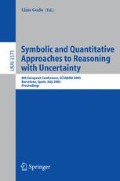Abstract
Several methodologies for function approximation using TSK systems make use of clustering techniques to place the rules in the input space. Nevertheless classical clustering algorithms are more related to unsupervised learning and thus the output of the training data is not taken into account or, simply the characteristics of the function approximation problem are not considered. In this paper we propose a new approach for the initialization of centres in clustering-based TSK systems for function approximation that takes into account the expected output error distribution in the input space to place the fuzzy system rule centres. The convenience of proposed the algorithm comparing to other input clustering and input/output clustering techniques is shown through a significant example.
Access this chapter
Tax calculation will be finalised at checkout
Purchases are for personal use only
Preview
Unable to display preview. Download preview PDF.
References
González, J., Rojas, I., Pomares, H., Ortega, J., Prieto, A.: A new Clustering Technique for Function Aproximation. IEEE Transactions on Neural Networks 13(1), 132–142 (2002)
Uykan, Z., Gzelis, C., Celebei, M.E., Koivo, H.N.: Analysis of Input-Output Clustering for Determining Centers of RBFN. IEEE Transactions on Neural Networks 11(4), 851–858 (2000)
Bezdek, J.C.: Pattern Recognition with Fuzzy Objective Function Algorithms. Plenum, Nueva York (1981)
Kasabov, N., Song, Q.: DENFIS: Dynamic Evolving Neural-Fuzzy Inference System and Its Application for Time-Series Prediction. IEEE Transactions on Fuzzy Systems 10(2), 144–154 (2002)
Pomares, H., Rojas, I., Ortega, J., Prieto, A.: A systematic approach to a self-generating fuzzy rule-table for function approximation. IEEE Trans. Syst., Man, Cybern. 30, 431–447 (2000)
Babuska, R.: Fuzzy modelling for control. Kluwer Academic, Dordrecht (1998)
Russo, M., Patane, G.: Improving the LBG Algorithm. LNCS, vol. 1606, pp. 621–630. Springer, New York (1999)
Moody, J., Darken, C.J.: Fast learning in networks of locally-tuned processing units. Neural Computation 1(2), 281–294 (1989)
More, J.J.: The Levenberg-Marquardt algorithm implementation and theory. Lecture Notes in Mathemattcs, vol. 630, pp. 105–116 (1978)
Duda, R.O., Hart, P.E.: Pattern Classification and Scene Analysis. Wiley, New York (1973)
Author information
Authors and Affiliations
Editor information
Editors and Affiliations
Rights and permissions
Copyright information
© 2005 Springer-Verlag Berlin Heidelberg
About this paper
Cite this paper
Herrera, L.J., Pomares, H., Rojas, I., Guillén, A., González, J. (2005). New Technique for Initialization of Centres in TSK Clustering-Based Fuzzy Systems. In: Godo, L. (eds) Symbolic and Quantitative Approaches to Reasoning with Uncertainty. ECSQARU 2005. Lecture Notes in Computer Science(), vol 3571. Springer, Berlin, Heidelberg. https://doi.org/10.1007/11518655_82
Download citation
DOI: https://doi.org/10.1007/11518655_82
Publisher Name: Springer, Berlin, Heidelberg
Print ISBN: 978-3-540-27326-4
Online ISBN: 978-3-540-31888-0
eBook Packages: Computer ScienceComputer Science (R0)

